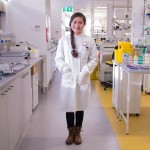
Rosemarie Guevarra
Medical Researcher
Menzies Institute for Medical Research
When I was young, I was a curious little child and I would question everything. I wanted to know how and why things happen. I remember how people would complain as I questioned everything, but I couldn’t help it because I wanted to know why and needed answers to satisfy those curiosities.
In college, I really enjoyed the science based subjects such as biology, health studies, and chemistry. Unsurprisingly, I set my heart on doing a science degree at university. I enrolled into a Bachelor of Science degree, majoring in Biochemistry and Microbiology. However, it wasn’t until my second year that I found my passion and decided that I wanted to go into the field of Medical Research. I was always aware of the diseases or disorders which arise in humans. Learning more about them made me realise that I wanted to be a medical scientist; to help understand diseases, or work towards a cure, treatment or prevention. I wanted to be able to help in some way, and knowing that I can contribute to science just fuels my passion more.
I decided to take my studies further by doing Honours and I’m currently undertaking a Bachelor of Science with Honours at the Menzies Research Institute, Tasmania. My project is situated within the neuroscience field, developing a therapeutic drug for chemotherapy-induced neuropathy (CIN).
CIN is a disease of the peripheral nerves, some of the symptoms of CIN include allodynia (painful sensation to stimuli), numbness, neuropathic pain (stabbing, burning or electric sensations), and sensory ataxia (loss of coordination); these symptoms can be debilitating and negatively affect the daily lives of cancer patients and survivors. Currently, there is no cure for CIN, however, from previous experiments, a protein called metallothionein II (MTII) has been found to be useful in the regrowth or replacement of nerve cells. Therefore, I am using MTII in a rat model of CIN and we are hoping to use these regenerative effects of MTII to fight against – and maybe cure – CIN.
Science is not always straight forward – there is always a lot of trial and error. But I think this is one of the reasons why I love science, is the fact that science is a puzzle. Also, since science is a diverse field, I have the opportunity to work with some amazing people who are helpful and knowledgeable.
For more information: www.menzies.utas.edu.au